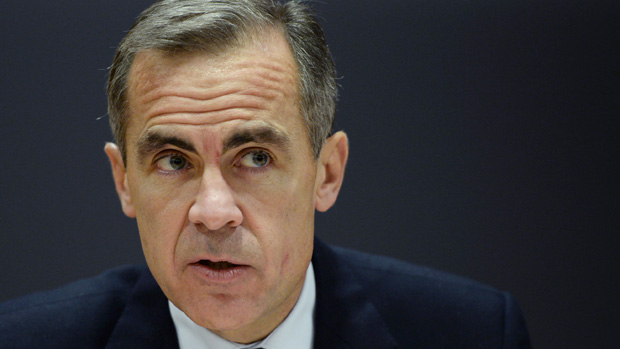Is there a bubble in the bond market?
The Bank of England has asked fund managers how they would deal with lots of investors cashing in their investments

A free daily email with the biggest news stories of the day – and the best features from TheWeek.com
You are now subscribed
Your newsletter sign-up was successful
In recent months the governor of the Bank of England, Mark Carney, and the former chairman of the Federal Reserve, Alan Greenspan, have both warned of the dangers of a "bubble" in the bond market. Meanwhile the New York Fed has said there is nothing to worry about.
What is going on and how could it affect your money?
What is going on?
The Week
Escape your echo chamber. Get the facts behind the news, plus analysis from multiple perspectives.

Sign up for The Week's Free Newsletters
From our morning news briefing to a weekly Good News Newsletter, get the best of The Week delivered directly to your inbox.
From our morning news briefing to a weekly Good News Newsletter, get the best of The Week delivered directly to your inbox.
The issue is that in recent years big funds have been reducing portfolio risk by investing huge sums into the global bond market, rather than the stock market. This has taken the value of the market for bonds - debt issued by companies that pays a fixed rate of interest as income - up to around £50trn.
At the same time, investment banks that provide liquidity for this market have pulled out. This leaves “few buffers against rapid movements in prices,” says Aimee Donnellan in The Sunday Times.
What does this mean?
Money pouring into the sector has pushed valuations higher than the payouts on the underyling bonds would usually be worth, which has dramatically reduced yields. Put simply, bonds are changing hands for more money and are therefore generating a smaller return from that fixed income.
A free daily email with the biggest news stories of the day – and the best features from TheWeek.com
“I think we have a pending bond market bubble,” said Alan Greenspan, former chairman of the Federal Reserve, in the Telegraph back in August. “If we merely substitute the structure of equity prices [for] the price of bonds, and instead of expected equity return we have expected interest rate return, that price-earnings ratio is in an extraordinarily unstable position.”
This creates the dynamic for a selloff. And people might offload assets for other reasons, for example if interest rates rise and they need to sell investments to deal with higher debt costs on their mortgage.
Mark Carney and the Bank of England are “concerned that financial bodies, including banks and insurers, may be underestimating the difficulty they could have in selling assets if there is a sudden market shock. This… could lead to panic selling, depressing prices for a ‘prolonged’ period.”
I have a bond fund, how might this affect me?
The worries in the bond market all come back to the issue of liquidity, or the ability of managers to give you your money back if you were to ask for it. If the worst fears are realised and a negative spiral sets in, managers may not be able to meet your demands - or could collapse under the strain.
At the moment, there is a “dangerous combination of fixed income funds with large levels of assets under management and reduced secondary market liquidity, as investment banks have been forced to scale back their role as active buyers and sellers of corporate bonds,” says Hardeep Tawakley in Investment Week.
This won't be a problem unless huge numbers of people start cashing in their assets at the same time. Regulators are worried, though, that if they did it could cause a serious problem.
The situation is certainly concerning Carney. It has been reported that he has asked 135 of Britain’s biggest fund managers to explain how they would cope if customers demanded their money at short notice.
Are we heading for a financial crisis?
Not everyone thinks we are on the brink of a crisis. Some experts think the issue will sort itself out.
Invesco Perpetual’s head of fixed interest Paul Causer told Investment Week liquidity could be a problem that would cause a “bottleneck in the market”. But that bottleneck would cause prices to fall and “it will get to the point where everything is so cheap it will be the investment of choice, and liquidity will come back”.
It is also worth noting that some big investors in bonds aren’t going to sell if the market gets volatile.
Retail funds only hold around 12% of global fixed income assets, according to Ken Volpert, head of investments and fixed income for Vanguard. “The rest is held by pension funds etc, who hold on through volatile periods. So, in terms of the impact on market prices, it is minimal.”
Does everyone believe in the bubble anyway?
There is research that suggests there is no liquidity crisis at all. The New York Fed has spent months studying bond markets and determined that “markets are actually evolving,” says Lisa Abramowicz on Bloomberg. “Hedge funds and others are stepping in and making markets, even as big banks pull back.”
A lot of money may have poured into the bond markets in recent years, but opinions remain completely split on whether that is a cause for concern. Only when a sell off occurs will we really see how illiquid the market has become.
-
 Political cartoons for February 3
Political cartoons for February 3Cartoons Tuesday’s political cartoons include empty seats, the worst of the worst of bunnies, and more
-
 Trump’s Kennedy Center closure plan draws ire
Trump’s Kennedy Center closure plan draws ireSpeed Read Trump said he will close the center for two years for ‘renovations’
-
 Trump's ‘weaponization czar’ demoted at DOJ
Trump's ‘weaponization czar’ demoted at DOJSpeed Read Ed Martin lost his title as assistant attorney general